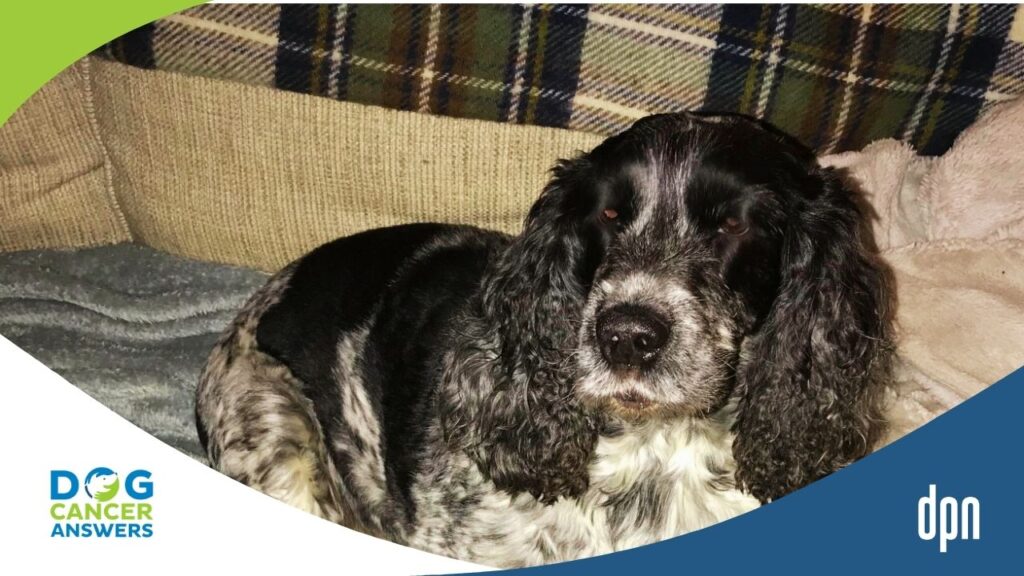>> James Jacobson: [00:00:00] [DPN Audio Logo]. Today’s show is brought to you by the bestselling book, The Dog Cancer Survival Guide: Full Spectrum Treatments To Optimize Your Dog’s Life Quality and Longevity. It’s available everywhere books are sold in both paperback and digital additions and on the publisher’s website at DogCancerBook.com. Use coupon code PODCAST on that website to get 10% off The Dog Cancer Survival Guide today.
>> Dr. Demian Dressler: [00:00:30] Because cardiac disease is extremely common, and mesothelioma is extremely rare, well, that leads to difficulty fighting these mesothelioma, cause you don’t look for it.
>> Announcer: [00:00:41] Welcome to Dog Cancer Answers, where we help you help your dog with cancer. Here’s your host James Jacobson.
>> James Jacobson: [00:00:49] Welcome, friend. Today, we are going to hear from a listener who has a dog with a rare type of cancer. It took a while to diagnose, and this listener is wondering why was it so hard to figure out what was going on with my dog? To answer this listener question, we’re turning once again to Dr. Demian Dressler. He is the co-author of The Dog Cancer Survival Guide. Dr. Dressler, welcome back to the show.
>> Dr. Demian Dressler: [00:01:15] Pleasure being here.
>> James Jacobson: [00:01:16] This question comes from Renee in Brooklyn, New York.
>> Renee Holmes: [00:01:22] This is Renee Holmes, calling from Brooklyn, New York. My dog, who is a poodle mix, a poodle, and Bichon mix, he’s 11 years old. He was recently diagnosed with mesothelioma back here this December. Three years prior, he started having issues with his belly filling up with fluid. And at that time they thought it was a heart tumor. And this was happening like, every three months, he would get his heart tapped and stomach drained every three months. But then it became more frequent. One time, I believe that one of the vets, that he had to go to for an emergency date, she says she might’ve got some fluid in his lungs or damaged his lungs.
Well, after that, He kept having fluid in his lungs and it kept happening more rapidly like every week or every two weeks. So now, he had a pericardium surgery in December and after the surgery, they said that will relax the stress on his heart, and that should resolve the issue. But a week later it came back, they did a biopsy on this tissue that they took from his heart.
And the first two times they said it was no cancer. When he came back, oh, two weeks later after the operation, they tested the tissue again. And this time they said it was mesothelioma. So my question is, how hard is mesothelioma to diagnose, and what are some symptoms that your pet has mesothelioma, because that’s from an environmental carcinogen.
So my question is how difficult is it to diagnose mesothelioma, and what is the standard treatment, and other treatments that we should give him to help them beat this cancer.
>> James Jacobson: [00:03:17] Dr. Dressler, mesothelioma.
>> Dr. Demian Dressler: [00:03:19] Yeah. Sorry to hear about this. It’s a, it’s a really rare cancer. That’s the first thing to understand. And that’s probably why you had a delay in the diagnosis, because cardiac disease causing fluid effusions is a hundred times more common. And so, that’s a problem. Say, when you’ve got cardiac disease, and when you’ve got, say a leaky valve, as an example, which you didn’t mention your dog had, but I’m assuming that there is some pre-existing cardiac disease going on, when the cardiac disease is present and it is capable of giving you the very signs that you’re seeing that a second disease can cause … That presents a real diagnostic problem.
So it’s sort of like, well, my dog has heart disease and now there’s fluid in the chest and in the abdomen. Well, yeah, that’s what heart disease does. Can I cure it? Uh, not without a valve transplant. Or a heart transplant. Well, that’s not happening. Okay. Then you’re stuck with it. So that’s usually how that thing unwinds.
Now it would only be after a very long period of time where we’d say like, gee, maybe this is not responding well to our usual treatments for preexisting cardiac disease. Then in that case, you’d start digging further. And so it’s not so much, that mesothelioma is hard to diagnose per se, it’s that you need to have it in front of your mind as a clinician in the beginning of the process.
And when you come up with a different diagnosis that’s way, way, way, way more common, it requires a really long period of time, usually, for the veterinarian or the doctor or the oncologist, or whoever, to start to question the assumption. So you can diagnose mesothelioma … You go get a CT scan and, or an ultrasound guided aspirate, or you tap the belly and you spin it down and you send it to a pathologist.
And they’ll see mesothelioma cells in there. So it’s not so much the diagnosis is hard. It’s that when it is mimicking something else that is not an easy fix, that particular pattern of events leads to delayed diagnosis, because one is in the mindset of a different disease, that’s hard to address … and the fact that it’s not going away when you’re addressing it, it just strengthens the first diagnosis.
>> James Jacobson: [00:05:30] It’s sort of like the idea you hear galloping and you “think horses not zebras.”
>> Dr. Demian Dressler: [00:05:35] Yeah, yeah. So if you were to go work up mesothelioma from the beginning, then you would find it.
>> James Jacobson: [00:05:41] Right.
>> Dr. Demian Dressler: [00:05:41] But because cardiac disease is extremely common, and mesothelioma is extremely rare, well, that leads to difficulty fighting mesothelioma, because you don’t look for it.
>> James Jacobson: [00:05:52] And Renee says, this is probably from environmental contaminants, which is how you get it, right?
>> Dr. Demian Dressler: [00:05:57] Yeah. You know, I mean, it’s a confusing one, you know, not very many people are living in an asbestos laden environment anymore. You know, that was from the fifties and sixties and the public health legislation around there, and the lawsuits around there, have made the asbestos carcinogen, which was the primary culprit for mesothelioma, much less. But nonetheless, you know, on the east coast, by the way, if you want to go check out, educate yourself a little bit on what are the surrounding environmental toxins, there’s a website, I think it’s EPA.gov. I can’t remember the exact one, but it’s a EPA.gov website. Look for EPA super fund site map.
>> James Jacobson: [00:06:38] So we’ll put a link in the show notes for that. So what do you think in terms of the standard treatments for this type of cancer, that it is so rare.
>> Dr. Demian Dressler: [00:06:46] They’re pretty dismal. You cut it out, you can infuse the body cavities with platinum compounds. You do platinum chemotherapy, you could do Palladia, but they’re all lousy, you know, truthfully. So in this particular case, I would probably be reaching for a lot of other things, you know, and I would probably be putting this dog on, on the usual which would, you know, Apocaps, Canine Immunity, modified citrus pectin. I probably also be putting in oral Neoplasene. I’d be adding oral Mirtazepine. I’d be adding low dose Palladia at about 25% of the label dose. And I would probably do low dose naltrexone and then continue the taps as needed, with monitoring of the blood work. So that would be my plan with this dog, but that’s a pretty, you know, complicated treatment regimen and you know, it’s a toughie. So the expectation would have to be there that like I’m not promising a cure.
Not at all. I am not familiar with the case, but typically these guys, you know, they don’t do well over years. That’s untruthfully optimistic. It’s usually less than that, but, I got to know more about the case to give you more specifics.
>> James Jacobson: [00:07:56] Dr. Dressler, thank you so much.
>> Dr. Demian Dressler: [00:07:58] Thank you.
>> James Jacobson: [00:08:00] And thank you to Renee for calling in with today’s question. Now, if you have a question for a veterinarian who specializes in cancer, please call in and ask your question on our Listener Line. The phone number is (808) 868-3200. And that number is in the U.S., so if you are listening from abroad, and we know we have a number of international listeners, please dial the U.S. country code, and then the phone number 808 868 3200. Or you can visit our website at DogCanceranswers.com. Well, that’s it for today’s show, friends. Please check the show notes for links to today’s sponsor The Dog Cancer Survival Guide at DogCancerBook.com. And you can also sign up for our free email newsletter at DogCancerNews.com and get the support that you need for free on our incredible private support group, it’s a Facebook group, and that URL is DogCancerSupport.com. All the links are in today’s show notes. I’m James Jacobson. Thank you for listening today. And from all of us here at Dog Podcast Network, I wish you and your dog, a very warm, Aloha.
>> Announcer: [00:09:19] Thank you for listening to Dog Cancer Answers. If you’d like to connect, please visit our websit at DogCancerAnswers.com or call our Listener Line at (808) 868-3200. And here’s a friendly reminder that you probably already know: this podcast is provided for informational and educational purposes only.
It’s not meant to take the place of the advice you receive from your dog’s veterinarian. Only veterinarians who examine your dog can give you veterinary advice or diagnose your dog’s medical condition. Your reliance on the information you hear on this podcast is solely at your own risk. If your dog has a specific health problem, contact your veterinarian.
Also, please keep in mind that veterinary information can change rapidly. Therefore, some information may be out of date. Dog Cancer Answers is a presentation of Maui Media in association with Dog Podcast Network.








